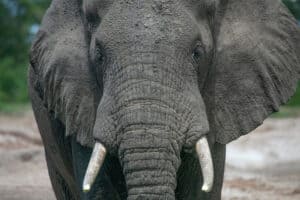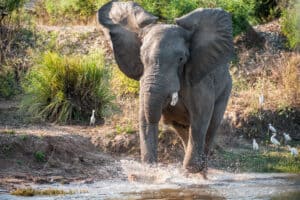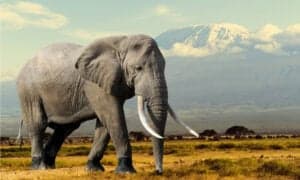Continue reading for our analysis...
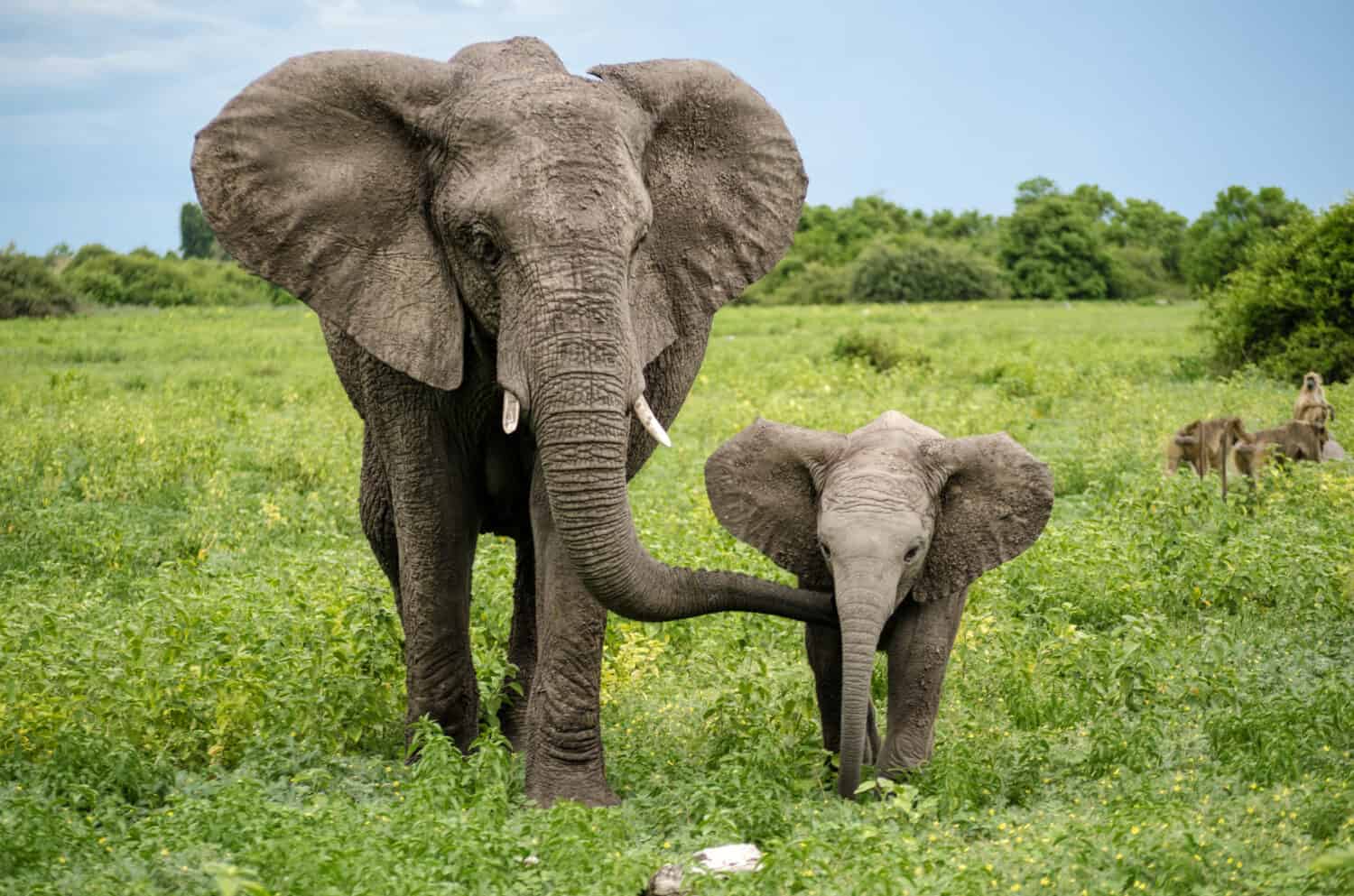
A mother elephant takes gentle care while letting her baby explore something new in this beautiful video. The African safari-goers stay calm and quiet as two female elephants (cows) approach with their babies (calves). This incredible encounter shows the intelligence of elephants that rivals our own. The mother elephant draws lines in the dirt, seemingly to warn the humans not to come any closer than that. The other elephant and her baby stand back and watch. The people take videos and pictures, in awe of what they are seeing.
After the calf takes some time to explore the vehicle, the mother elephant tenderly wraps her trunk around it and moves it slowly away. The interaction lasted only a few minutes, but those who bore witness in person will surely remember it all their lives. What an unbelievable experience to have been a part of. Learn more about elephants after watching the video!
Are Elephants Good Mothers?
Absolutely! Mother elephants display some of the most loving and gentle behavior toward their calves that has ever been noted in the wild.
Baby elephants must learn quickly after birth how to stand, walk, and follow their herd. Born at just 200–300 pounds, calves weigh less than 4% of the weight of their mothers. Cows weigh 5,000–8,000 pounds while adult males (bulls) weigh up to nearly 14,000 pounds! These babies are so small in comparison to the adults, they require protection from the whole herd.
Calves must learn everything about life from the herd in order to survive. After nearly two years in the womb, they spend another 10–12 years growing and learning before becoming adults. Mother elephants teach their babies everything from how to find shade on scorching hot days to the best places to get water. Babies must learn what plants are safe to eat and to dust themselves to keep biting insects off. They also learn to cover themselves in mud to protect their skin from the sun. Learning what route to take during migration is also of utmost importance. Being with the herd is essential to the babies’ survival. In fact, baby elephants need to eat some dung from their mother and the herd. That’s so they can gain the natural intestinal bacteria they need. Without this, they have problems digesting their food.
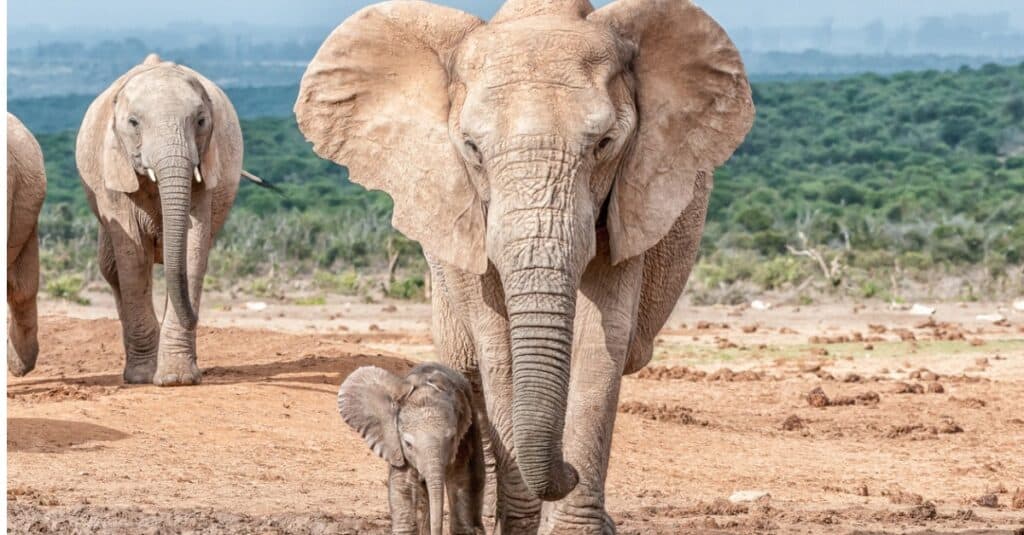
Mother elephants take excellent care of their babies.
©iStock.com/GroblerduPreez
Mother elephants teach their babies so much, just like human mothers. They protect them at all costs. Without its mother and the herd, an elephant calf will surely die.
Orphaned Elephants
Unfortunately, calves become orphaned fairly commonly. Baby elephants are orphaned either through poachers killing the mothers or somehow getting separated from the herd. Orphaned calves find themselves alone, starving, and afraid. They are prone to eating plants they shouldn’t out of desperation and hunger, which makes them ill. They also might become dinner for predators.
Some organizations, like the Sheldrick Wildlife Trust, dedicate themselves to rehabilitating orphaned elephants and returning them to the wild. You can even adopt an orphan elephant to help the trust provide the best care for them! They even have wildlife ambulances that help wild animals in need of veterinary care.
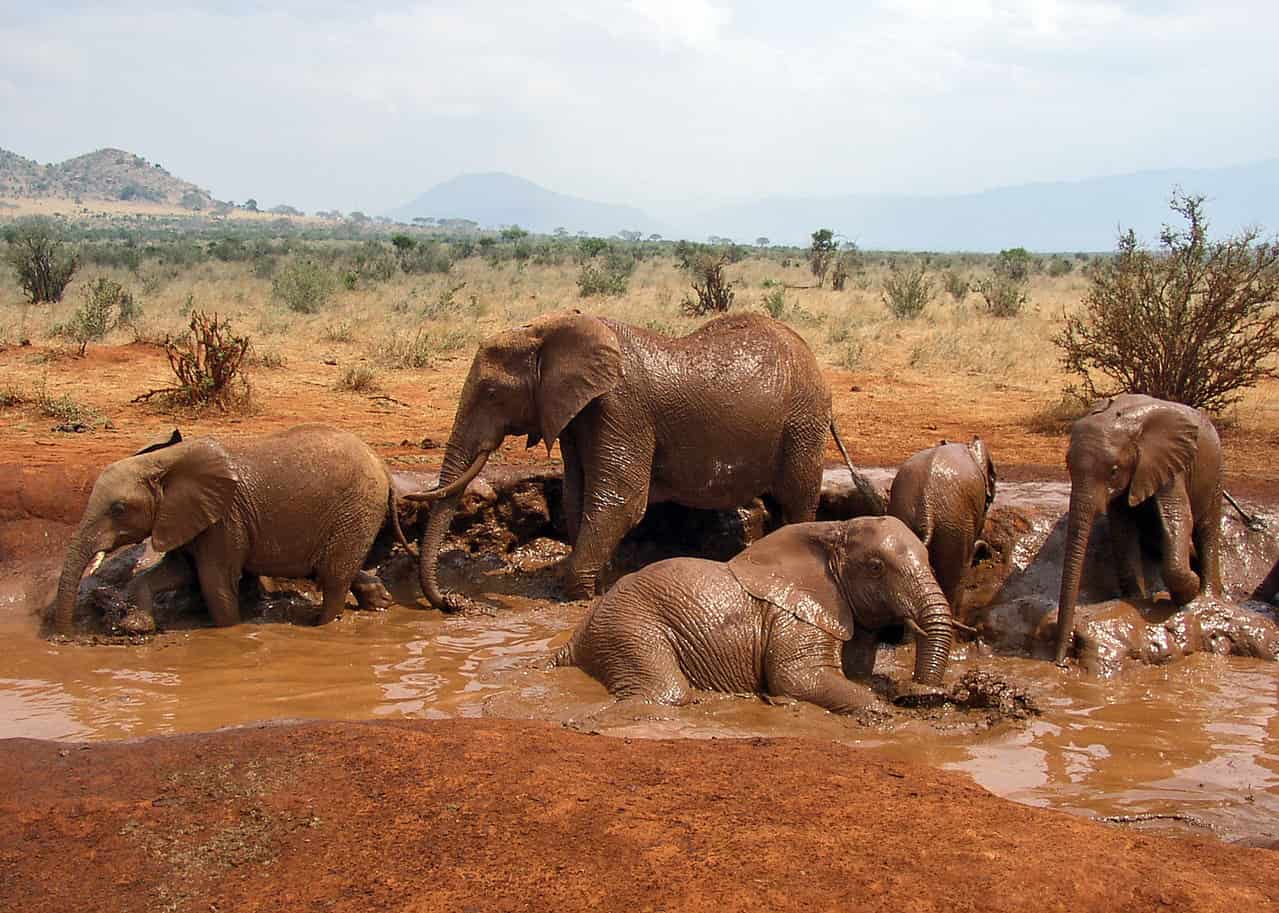
Mother elephants teach their babies everything, including to take a mud bath on hot days to protect their skin.
©I, Mgiganteus, CC BY-SA 3.0, via Wikimedia Commons – Original / License
Why Are Mother Elephants So Protective of Their Young?
Mother elephants not only protect their young but the herd as a whole. Actually, the entire herd protects one another. The survival of the next generation depends on the herd’s ability to keep the babies safe until they reach an age where they can defend themselves. Once they mature, the youngsters begin protecting the herd and younger calves just like the rest. If elephants cannot protect their young, the species will cease to exist. This fact is why elephants are so protective of their young and one another. If a baby is in danger, all the others will try to help.
Part of their protectiveness stems from how amazingly intelligent they are when it comes to recognizing resources, each other, and threats to the herd.
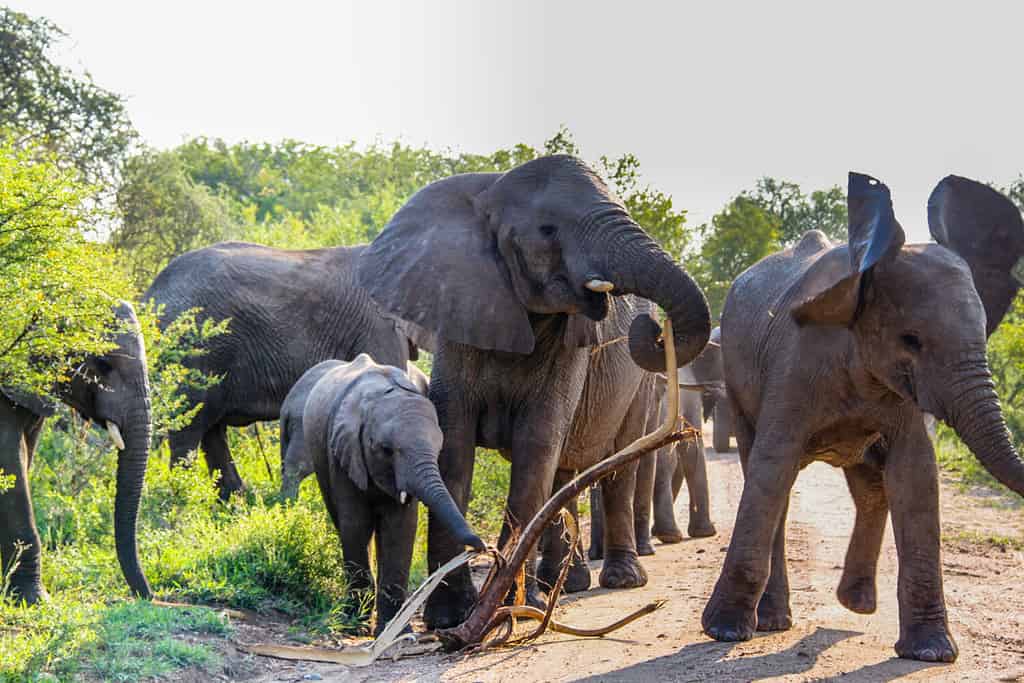
Mother elephants work together with the herd to protect the babies and one another.
©Julia Chan Kar Wai/Shutterstock.com
How Smart Are Elephants?
One cannot simply write about elephants without talking about how astonishingly intelligent they are. Over many years, humans have studied elephants. We’ve constantly been amazed at their social and emotional intelligence. We also marvel at their ability to communicate and use tools. Most remarkable, though, is the elephant’s capacity for empathy. Empathy means showing care about someone or something else’s feelings and well-being.
Elephants recognize one another and communicate with vocalizations and body language. Mother elephants recognize their individual calves, even though they help care for every calf in the herd. Some cows babysit multiple calves while the other mothers look for food or rest. The matriarch (leading female) of the family passes down information from generation to generation. Even bull elephants keep near the herd, watching out for trouble. Elephants are some of the smartest wild animals on the planet!
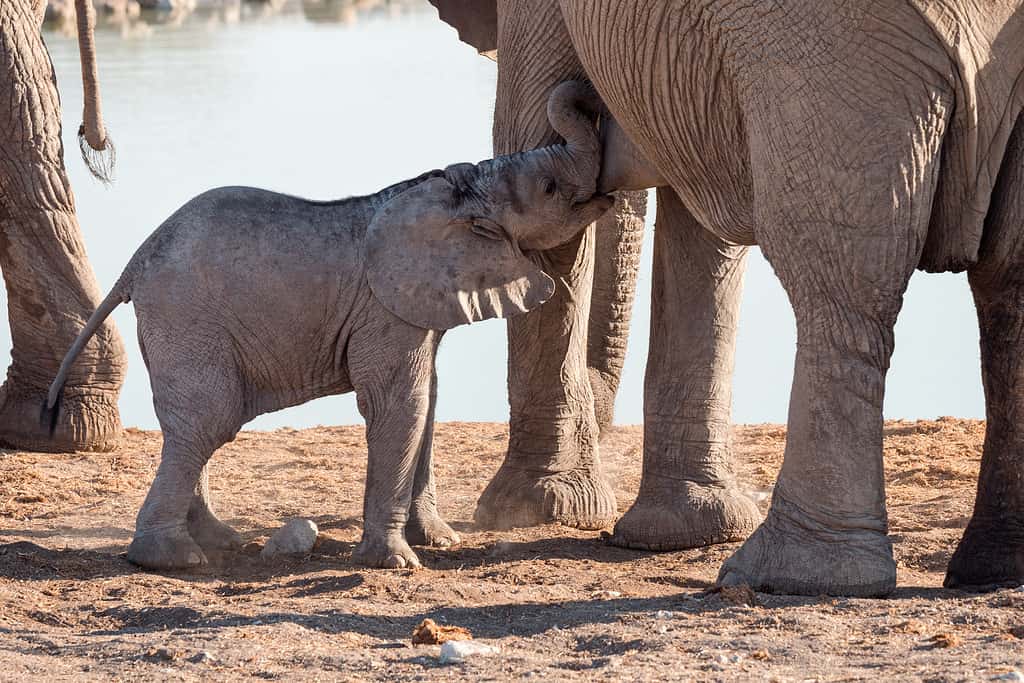
Elephant mothers nurse their own babies along with others in the herd.
©Dietmar Rauscher/Shutterstock.com
Social and Emotional Intelligence
One study analyzed reports and research from a 35-year period regarding elephants. They found that elephants possess the ability to recognize problems and make plans to overcome them. They enlist the help of others and communicate effectively to reach their goals. Elephants bury their dead and mourn them, often returning to grave sites yearly to pay their respects. These marvellous creatures even recognize when their family member is injured and needs help to get up or walk. Some observations saw elephants removing tranquilizing darts from others with their trunks. Others were recorded comforting one another, wrapping their trunks around them in what appeared to be a hug.
Communication and Tool Use
Elephant Voices, a conservation organization, constructed The Elephant Ethogram to teach people about how elephants communicate in the wild. This amazing collection of photos, videos, and reports shows just how impressive elephant communication truly is. Moreover, elephants don’t just communicate with each other, but with humans and other species, too.
In our video, the mother elephant draws lines in the dirt. Some suspect this is a direct recognition of a barrier. She trusts that the humans understand they should stay on their side of it. Similar occurrences regarding elephants communicating with humans have been recorded all over the world. Another study found that elephants in captivity enjoyed spending time with their keepers and interacting with zoo visitors.
Have you ever seen an elephant paint a picture? Though these elephants receive guidance from their keepers, the ability to hold a brush and paint with it shows they are willing and capable of using tools. Instances of elephants using tools in the wild have also been recorded.
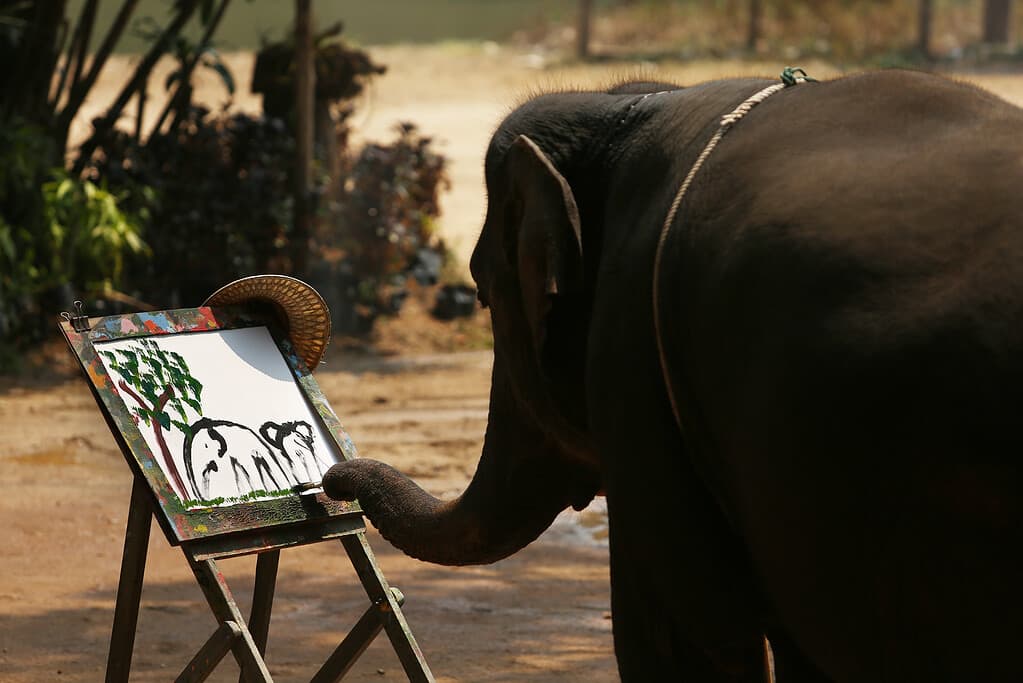
Elephants of all species can be taught to paint! Isn’t that amazing?
©Roylee_photosunday/iStock via Getty Images
The Empathy of Elephants Extends Past Their Own Kind
Wild elephants have even been recorded helping other species, as well. This shows that they understand pain, fear, and other emotions even when they come from other animals or people.
In 2012, a safari guide by the name of Louis Locke documented such a case in Chobe National Park, Botswana. A mother hippopotamus had just given birth to her calf and lay exhausted on the river bank. A hyena saw this as an opportunity for an easy meal and grabbed the baby, dragging it away. Onlookers were shocked at the scene but knew they could not get involved. Suddenly, a massive mother elephant rushed in, leaving her own baby unattended. She charged the hyena with such aggression that it dropped the baby and ran away. The mother hippo gathered her strength and went to check on her calf. Though it was missing its right ear, the calf was relatively unharmed. Locke reports the mothers stared at one another for a brief moment before parting ways with their babies. Some time later, when Locke returned to the area, they reported seeing the baby with the missing right ear and its mother doing well.
This story captivated the writers of the documentary Do Elephants Go To Heaven? They chose to include it in their movie to help bring awareness to the empathy and compassion that elephants show. The goal of the documentary is to encourage humans to show that same empathy and compassion to elephants.
Thank you for reading! Have some feedback for us? Contact the AZ Animals editorial team.




